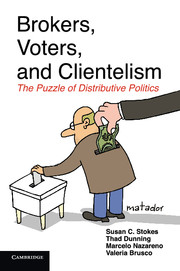Book contents
- Frontmatter
- Dedication
- Contents
- List of Tables
- List of Figures
- Preface and Acknowledgments
- I MODALITIES OF DISTRIBUTIVE POLITICS
- II THE MICRO-LOGIC OF CLIENTELISM
- III THE MACRO-LOGIC OF VOTE BUYING: WHAT EXPLAINS THE RISE AND DECLINE OF POLITICAL MACHINES?
- 7 Party Leaders Against the Machine
- 8 What Killed Vote Buying in Britain and the United States?
- IV CLIENTELISM AND DEMOCRATIC THEORY
- Appendix A: Argentina Brokers' Survey
- Appendix B: Argentina Voters' Surveys
- Appendix C: Venezuela Voters' Survey and the Maisanta Database
- Appendix D: India Voters' Survey
- References
- Index
- Miscellaneous Endmatter
7 - Party Leaders Against the Machine
Published online by Cambridge University Press: 05 June 2014
- Frontmatter
- Dedication
- Contents
- List of Tables
- List of Figures
- Preface and Acknowledgments
- I MODALITIES OF DISTRIBUTIVE POLITICS
- II THE MICRO-LOGIC OF CLIENTELISM
- III THE MACRO-LOGIC OF VOTE BUYING: WHAT EXPLAINS THE RISE AND DECLINE OF POLITICAL MACHINES?
- 7 Party Leaders Against the Machine
- 8 What Killed Vote Buying in Britain and the United States?
- IV CLIENTELISM AND DEMOCRATIC THEORY
- Appendix A: Argentina Brokers' Survey
- Appendix B: Argentina Voters' Surveys
- Appendix C: Venezuela Voters' Survey and the Maisanta Database
- Appendix D: India Voters' Survey
- References
- Index
- Miscellaneous Endmatter
Summary
In Part II of this book, we studied the micro-logic of broker-mediated distribution. Our focus was on understanding the incentives that guide the behavior of brokers, as well as those facing voters and party leaders. The goal of Part II was to understand what drives brokers to build ideologically heterogeneous networks of voters, ones that are notably heavy in loyal supporters. We sought to explain how brokers may extract rents from party leaders. Our formal model in Chapter 3 generated insights into the political inefficiencies that broker-mediated distribution of benefits can produce, from the point of view of vote-maximizing political leaders. Our evidence presented in Chapters 4 and 5 showed that the incentives of party leaders and brokers can indeed diverge in ways that have important consequences for the political logic of transfers both to individual voters and to aggregates of voters, such as those residing in provinces, municipalities, or districts. We have seen that brokers can help to make vote buying effective; yet the reliance on brokers can also diminish the political efficacy of clientelist parties as vote-seeking organizations. Thus our argument suggests that clientelism carries electoral costs as well as benefits for political leaders.
What, then, explains the incentives of party leaders to perpetuate a system of broker-mediated distribution in the first place? This question takes us toward a broader terrain, one focused on the rise and decline of clientelism in various countries over time. Understanding what gives rise to clientelism, and what kills it, is more uncertain territory: the questions are bigger and messier, the evidence necessarily more tentative.
- Type
- Chapter
- Information
- Brokers, Voters, and ClientelismThe Puzzle of Distributive Politics, pp. 175 - 199Publisher: Cambridge University PressPrint publication year: 2013



